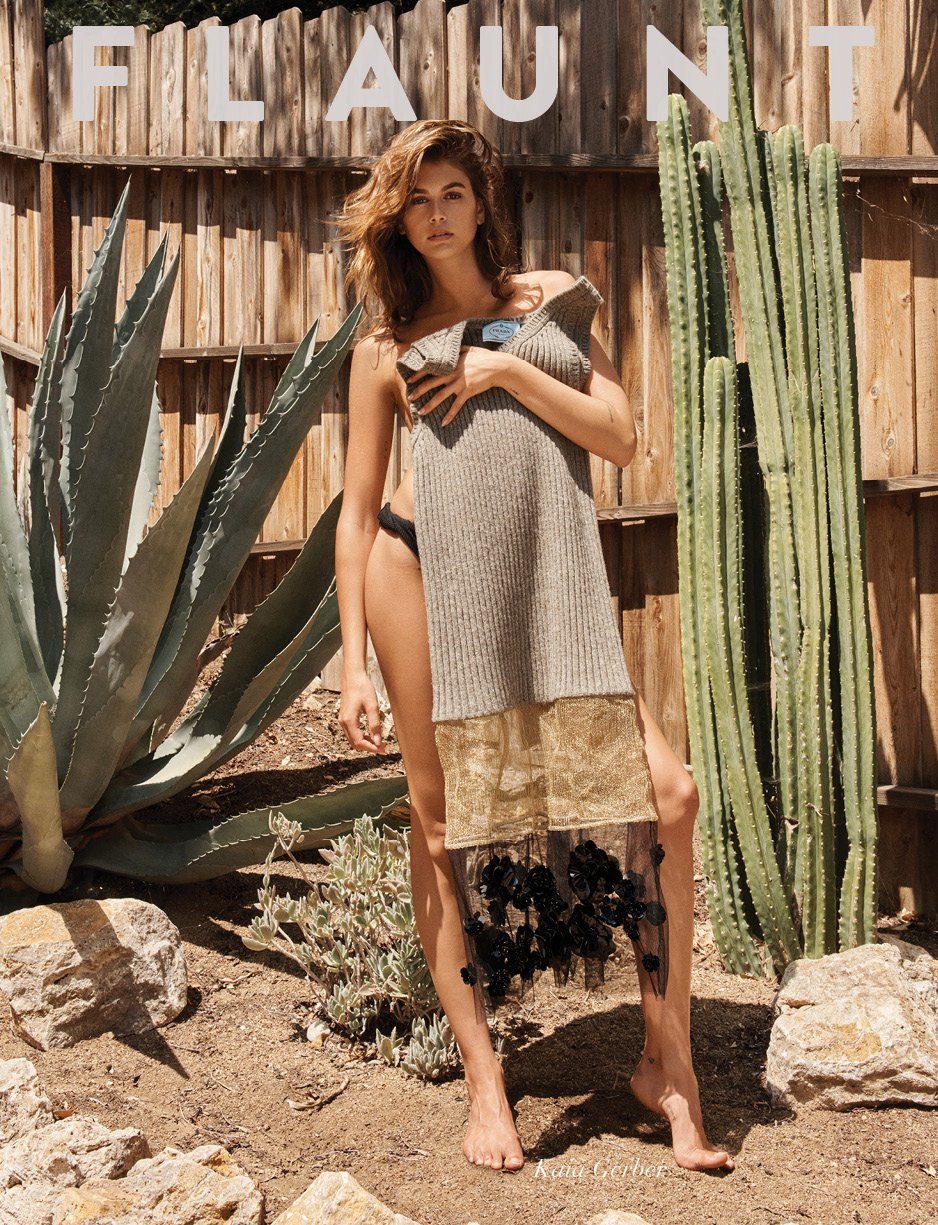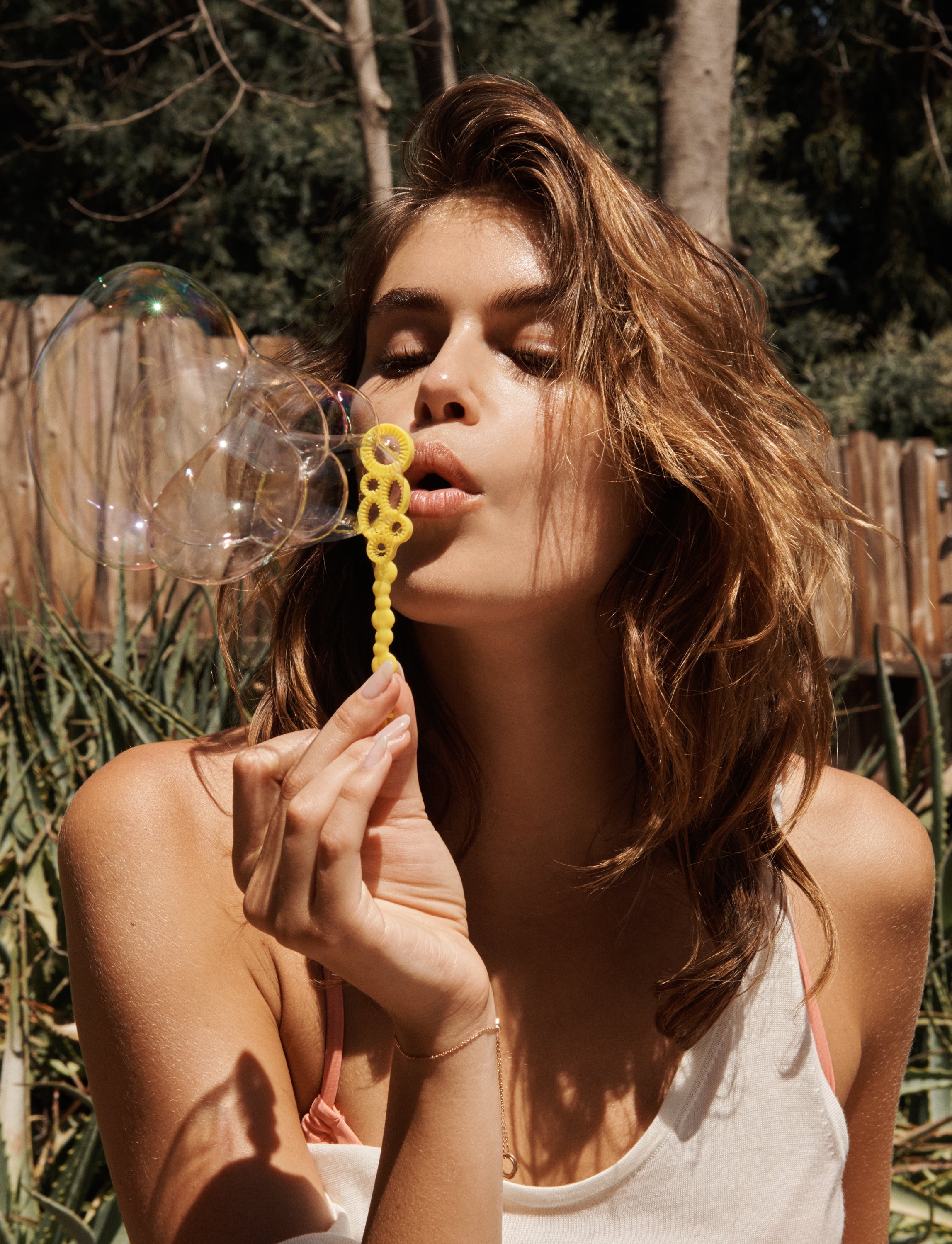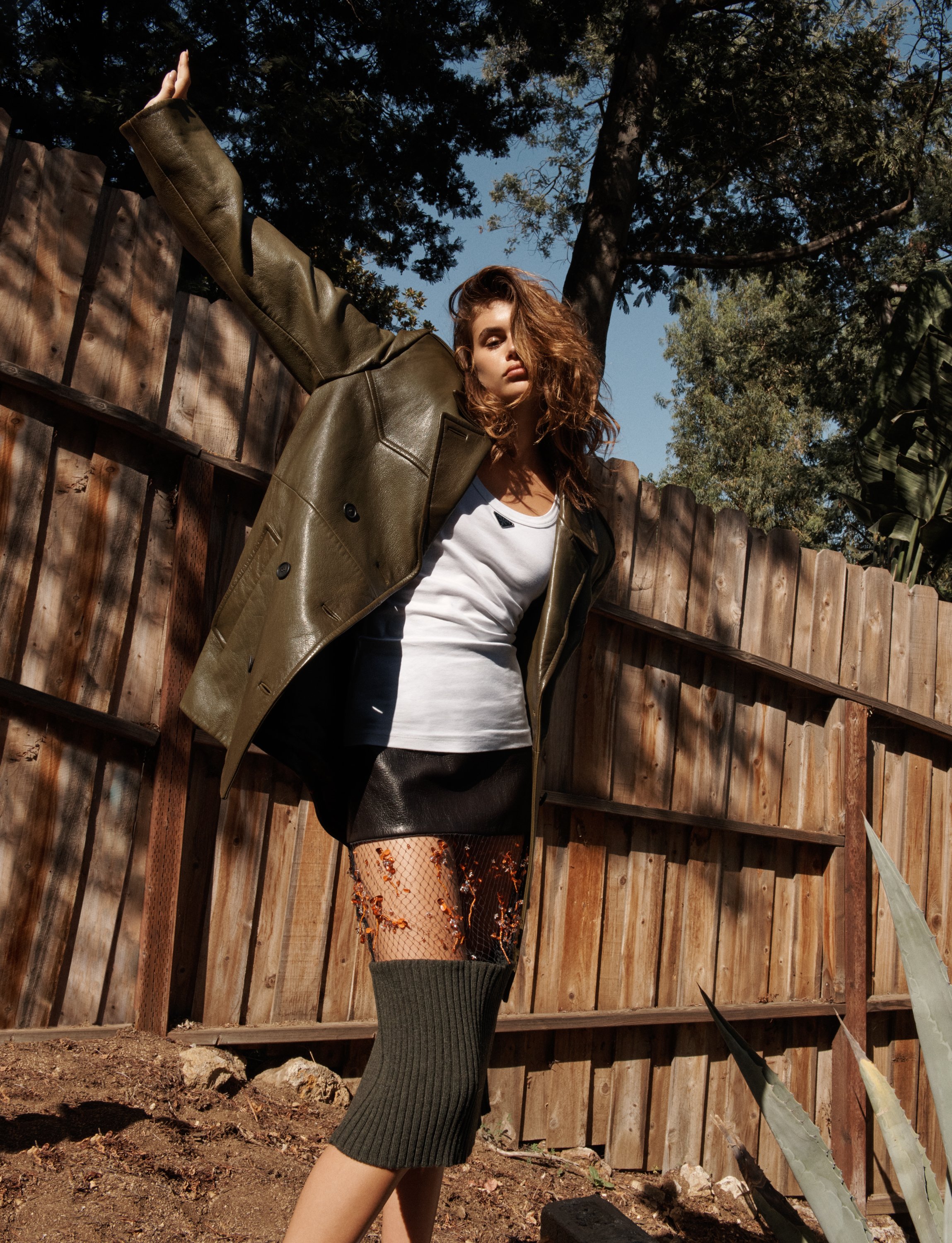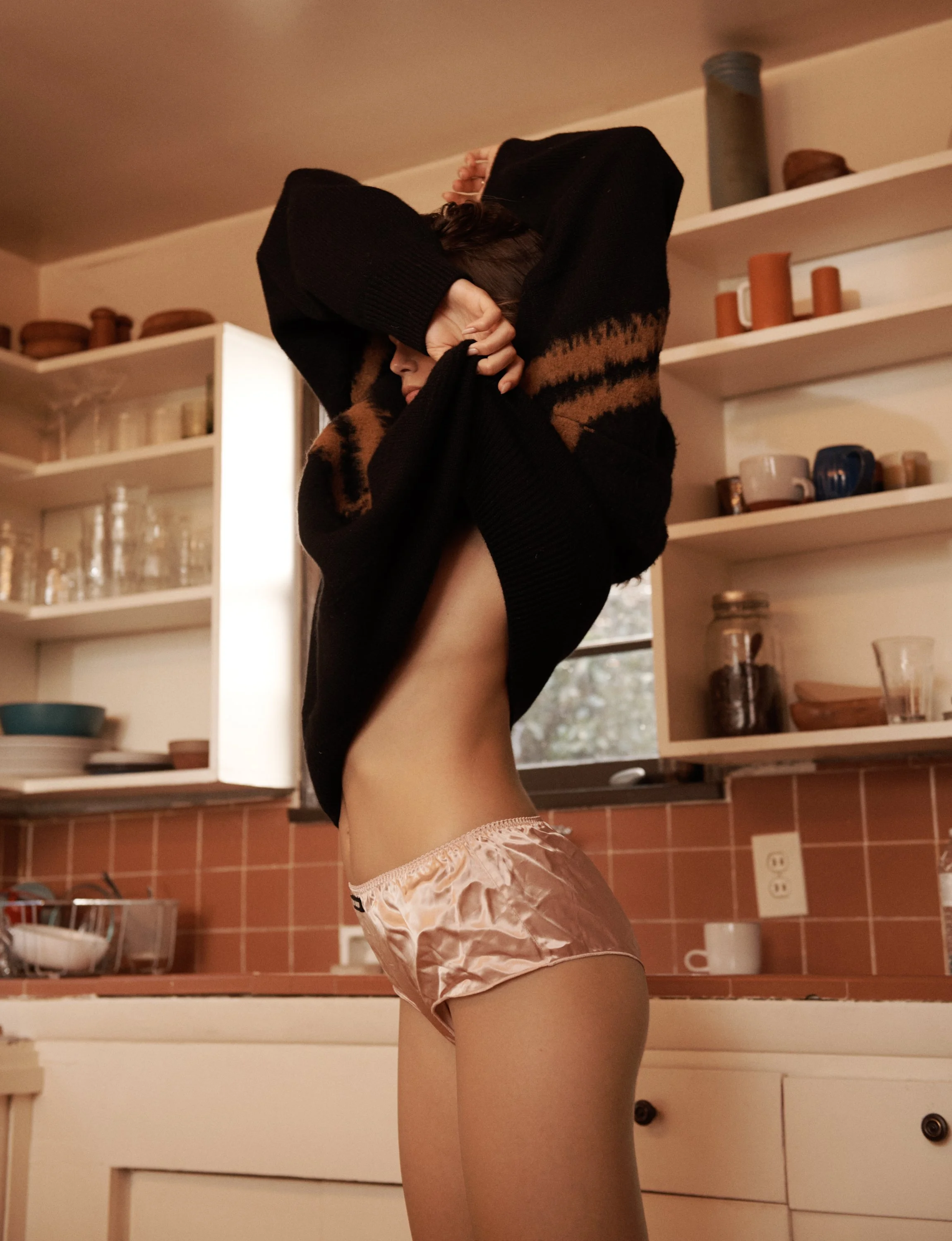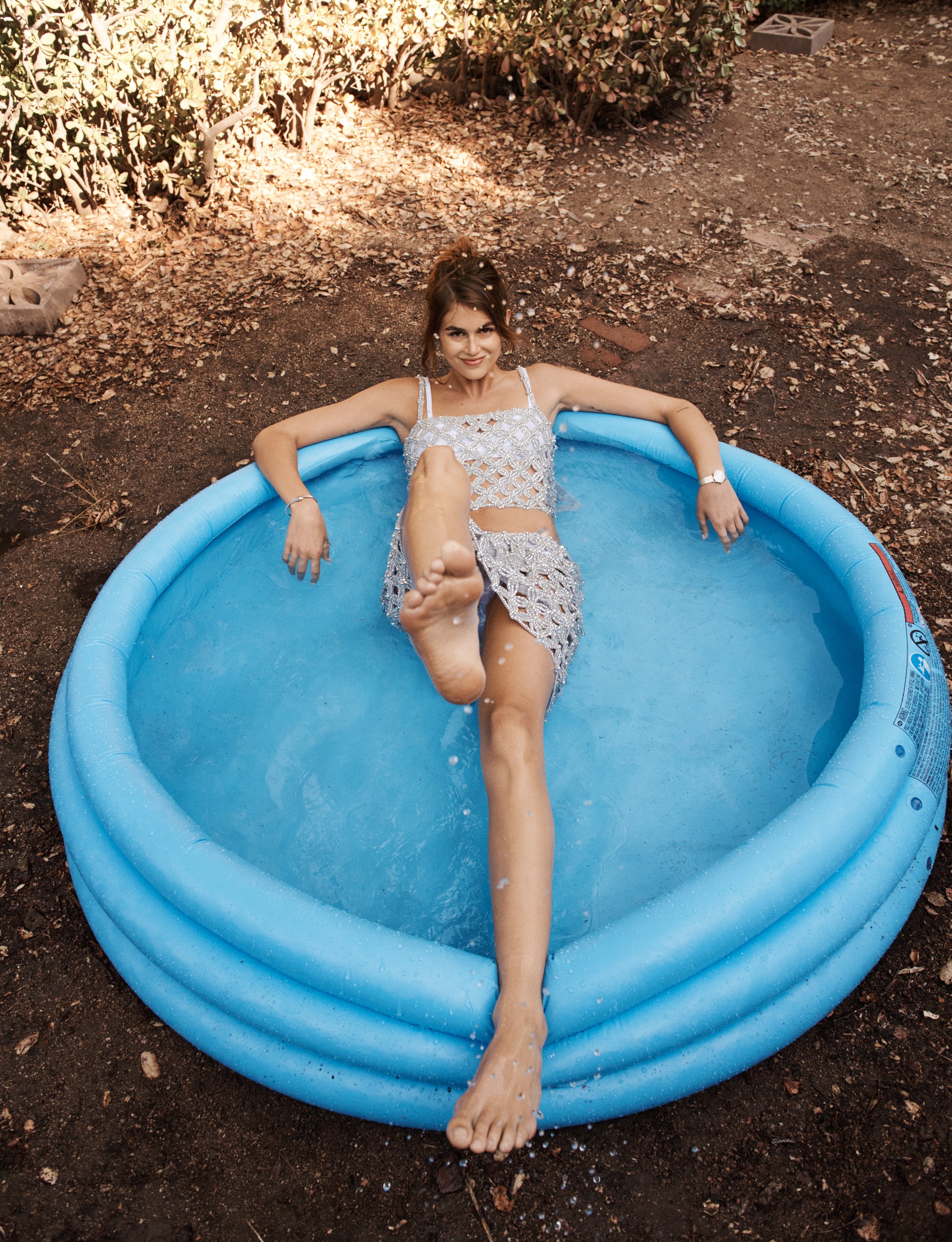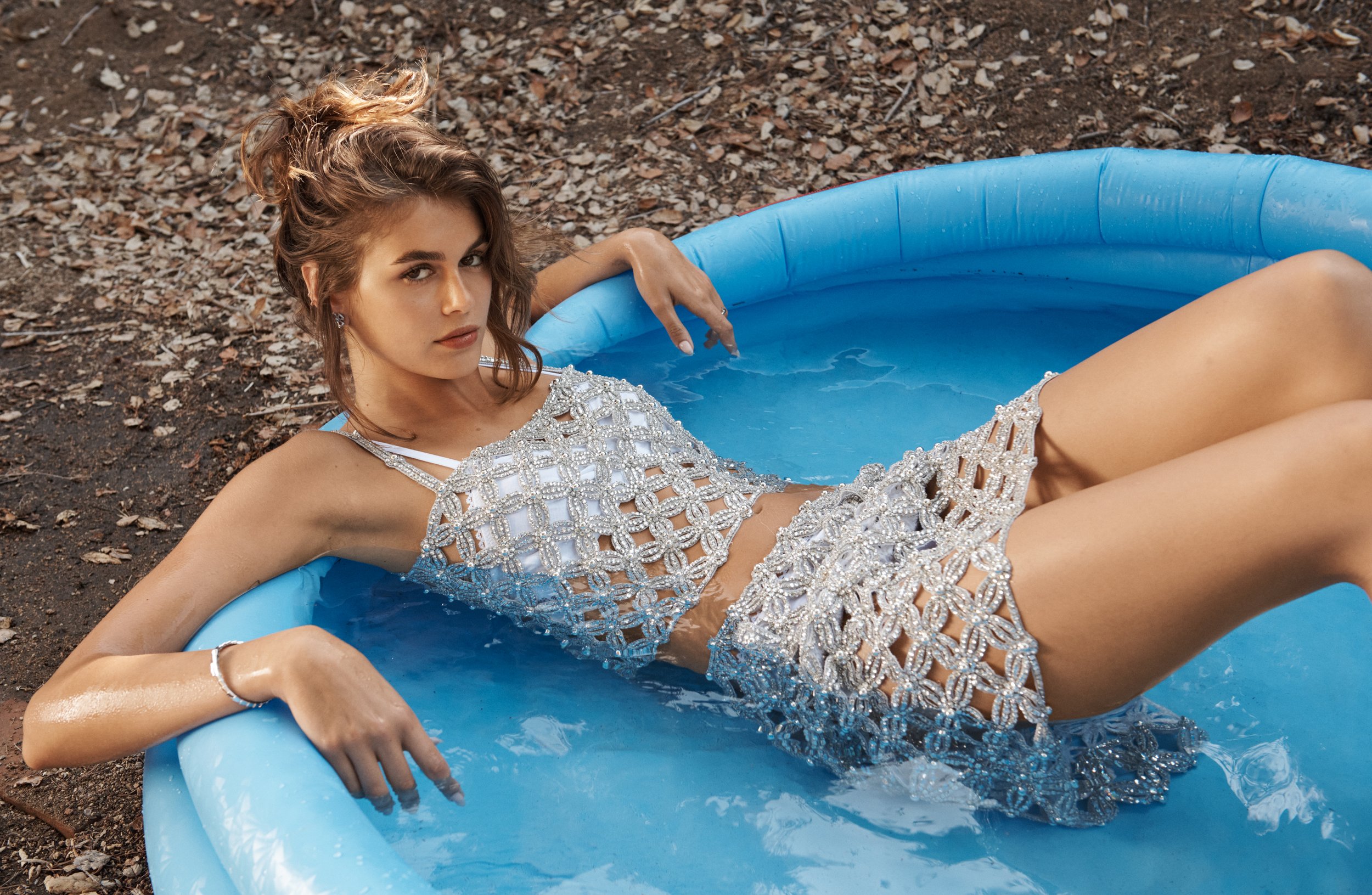Kaia Gerber | Radical Tuber
by Matthew Bedard
PRADA dress and underwear.
Halfway through my oceanside conversation with actor, supermodel, and Malibu native, Kaia Gerber, on the eve of her 21st birthday—as the Pacific Ocean churns with late August heat, as a handful of beaches remain closed to our immediate south due to hazardous bacteria levels, as the afternoon concedes to dusk, the water restyling from blue to cobalt to royal purple—the word ‘radical’ enters our dialogue. We pause on its meaning, as lovers of the word are wont to do, and both affirm we don’t know its dictionary definition—only its spirit. I take a stab, suggesting that its origins sound biological, probably connoting something like ‘against nature.’ Kaia politely reserves agreement. Later, I learn I’m wrong.
Before numerous definitions that imply ‘radical’ and ‘radicalism’ in our social order, Merriam-Webster’s first definition reads:
1: of, relating to, or proceeding from a root: such as
a (1) : of or growing from the root of a plant
radical tubers
(2) : growing from the base of a stem, from a rootlike stem, or from a stem that does not rise above the ground
radical leaves
I am both delighted and amused. First, because my instinct, thinking about radical behavior, saw the word connoting severance or disembark. This is the opposite—this is fortification. Second, because the research will allow a very pliable metaphor for my conversation with the international star.
So, let’s run with it. Here I am sat with a thriving root extension of seriously successful LA transplants—one of whom, most famously, founded the ubiquitous Casamigos Tequila alongside an A-list actor and a real estate over achiever, the other of whom, perhaps more famously, starred in a paralyzingly sexy Pepsi commercial that premiered during the Super Bowl in 1992. Both continue to be beautiful, to be philanthropic, to enterprise and baton-pass to their two children, the female half of whom is enjoying an orange juice at Little Beach House, arguably the most environmentally threatened SoHo House outpost, given the California coast’s penchant for inch-by-inch receding into the sea.
FENDI top, MIU MIU briefs, and ARAKS underwear.
CHLOÉ tank top.
As we sit down, Gerber tells me that she is planning a move across Los Angeles, where a vast lattice of freeways and urban disorder will separate her from the all too familiar ‘Bu. As if on cue, a waiter arrives to say hello, to tell her she’s “gotten bigger,” he remembers her as a little girl, and that he sees her parents “all the time.” Gerber counters with warmth, then shrugs her shoulders and echoes her earlier declaration about her surrounds, “Small town.”
Gerber is chiefly known for being a supermodel. She opens shows like Prada and closes shows like Marc Jacobs. She’s done all the big covers. At present, her face can be seen on a bus stop near Flaunt HQ in Hollywood, albeit with very large shades on, for the Celine Fall Winter ’22 campaign. For the past 6 years, hers has been an inextricable presence in fashion. However, while Gerber will continue to kiss the cheeks and the fashion weeks of the luxury establishment, her heart seems rather set on acting.
Having cut her teeth on 2016’s Sister Cities, Gerber followed with an appearance on Ryan Murphy’s cult-favorite, American Horror Story last year. She will soon be seen in queer high school comedy, Bottoms, also starring the unflinchingly compelling Marshawn Lynch, AKA Beast Mode. And in the most substantial project yet, this summer she came aboard, and is currently shooting, another comedy, Mrs. American Pie—alongside heavy hitters Kristen Wiig, Laura Dern, and Ricky Martin, among others—a 10-part series and early 1970s satire of the renowned Palm Beach social hierarchy, as a manicurist called Mitzi.
Kaia Gerber is very beautiful, which is no news flash. So that’s as much as we’ll say on that, and her and I don’t really talk beauty or vanity, save for its hindrance potential in certain contexts. But you know that feeling, when you’re hamming it with someone that loves to read? When the words are carefully chosen, and more carefully listened to? When it’s evident that language means a lot to this person, because of the escape it creates? Or the power it possesses? That’s what it’s like hanging with Gerber, as German teens interrupt to ask for selfies with her, as she enjoys a day off from immersing in an artform she’s fervently embracing because of its ability to granulize her existence, to make her feel instead of repress, after so much accustom atop the pretty heap, as she describes all the time alone on the road, in her early modeling days, devouring books in lieu of her “small town” high school, left behind when she hit said road. Here is an actor stepping into her stride with a newly diversified confidence—one of observation, care, and emotional elasticity. Here is Kaia Gerber on presence, Roe v. Wade, masculinity, and the mutational nature of information these days. Here is a radical tuber we’re excited to witness cascade up toward the sun.
MIU MIU briefs, ARAKS underwear, and BVLGARI earring.
FENDI top, MIU MIU briefs and ARAKS underwear.
‘Presence’ is such a buzzword of late. Do you feel like you’re in the moment?
It’s so hard. I think it’s a fine line, where you can easily fall into this, ‘Well, once I do this, this, and this, and I do that, and I meditate this many times a day, then I’ll be happy. And you’ll never do all the things they say you have to do to be happy. We’ll always have things to do, to improve—we’ll never be at net zero. I was just listening to this thing on the Waking Up app, which I use for meditation sometimes. They have this series called ‘Time Management for Mortals,’ and they were talking about something that really resonated with me: it’s physically impossible for us not to be in the moment. We can’t be anywhere else. I mean, all religions, everyone talks about presence like it’s this unattainable thing, and when you look at it, in actuality, it’s the only thing we can be. I think that realization takes some pressure off.
Yes, it’s maybe the classic question of destination versus journey. How has the acting journey been thus far?
Hard. There’s so many things you can’t control. So much is coming from other people. I can rehearse something a million times, and then get there, and I don’t know what you’re going to give me that day, where you’re going to be at that day, or where I’m even going to be at emotionally that day.
Perhaps that experience is a certain kind of presence, then?
I mean, you have to let things affect you in this line of work, which is really hard. You know, I have been in another line of work, where you couldn’t really let things affect you, or you couldn’t be too sensitive.
GIVENCHY dress, CELINE boots, and CARTIER necklace.
CHLOÉ top and CARTIER bracelet.
In regards to that experience in modeling and high fashion—channeling that icicle attitude, that shield or toughness—how do you hope to platform that into performances? Where does that give you strength?
When I was in it, and experiencing it, I was very unaware of the way I affected other people. Like whether I was cold or really welcoming, I didn’t have the emotional intelligence yet to be aware of that. I think, also, I was really young, and felt so insecure, and was so wanting to seem like I deserved to be there, and wanting to do a good job, and wanting to seem adult—all these things going on. A lot of things happened to me that at the time that I didn’t know how to process. I look back at that period of my life in pictures, and I’m like, ‘No one would ever have known.’
As for how it might translate to my acting, there can be so much going on inside, you know? And you don’t always have to play the obvious thing. I got very good at playing my emotions. Knowing that coldness, or that strength, can have so many other things going on behind it. So, in a way, that was a version of acting, you know? There weren’t a ton of emotions welcome in certain spaces, and that’s true for everyone, I think, for work—for any professional environment that isn’t acting. In school, from when you’re a kid, you learn to show up, and you can’t always act the way that you feel. Learning that distinction has been really helpful for me.
Is there a sort of release happening within you, then, when you’re conceding to this larger creative organism of film and TV?
Yes! I mean, even though I feel this immense pressure of wanting to do well, because I care so much about it, it also feels like this massive weight off my chest. You can’t control this—this is something so much bigger than me. I mean, everyone is showing up so emotionally available and open, and what a gift, because that’s so rare. It’s a very different way of moving through the world.
PRADA jacket, tank top, and skirt.
How is it a different way of moving?
I was closed for a very long time, I think, in order to do that job, and also to be someone that people looked at. Especially being so young—I was 16. I did not expect the success that I was fortunate to have. Along with that comes a lot of things I did not know how to navigate. Whatsoever. So I think the easiest thing for me was to close off and try not to let things deeply affect me too much. But then, I got really good at doing that. So it’s been learning how to also release that, and I think that’s why it’s been so liberating for me. It’s like I’m allowed to scream at somebody with no real world consequences, and I’m allowed to cry, and I’m allowed to get angry, or be overly happy—those were not things that I felt I could do. I had an acting teacher once say, ‘We’re not directing air traffic, so we can make mistakes’—what a cool thing to be able to do?
That plunge into such an adult world must have been pretty intense at times?
I’ve always wanted to grow up—my whole childhood felt like waiting to grow up. And now my whole adulthood is wanting to be a child again. And everyone tells you, ‘You’ll have the rest of your life to be an adult,’ and you don’t believe them, and act like an adult, and you miss important moments—especially in my case, where I was off working, fast-forwarding on a lot of maturing… You don’t actually fast-forward, though. You, like, skip. And I feel a lot of my adulthood will continue to be like, ‘Okay, what did I miss?’ I have to backpedal a little bit—I didn’t learn that lesson, I didn’t do that yet.
PRADA skirt.
DIOR bralette, LOEWE pants, and TIFFANY & CO. necklace.
And so what are you working on?
I just finished a comedy in New Orleans called Bottoms, which was my first time filming something not in LA. It’s with Rachel Sennott, who I think is just wonderful, and Ayo Edebiri. Maybe you’ve seen Ayo in The Bear? She’s so great in that. And it’s directed Emma Seligman. Emma and Rachel wrote it and they found a voice that I think I’ve never heard before. It’s cool when they give young people money to make movies that are not anything like anyone has ever seen before.
And then, right now, I’m filming something here for Apple TV +, Mrs. American Pie, which is also a comedy. I don’t think I’m funny, but somehow I’m doing comedy, and I’m just waiting—maybe people will figure out one day I’m not funny, but I’m riding it as long as I can.
Maybe that’s the joke?
I think what I realized is you can’t be in on the joke if you want to be funny. Because I never feel funny, and then afterwards, I see people laughing and I’m like, ‘That was serious.’ And maybe that’s the key to it, or maybe that’s my way? Everything is serious to me. Like everything is a drama. And I’ve always loved dark comedies. I’ve understood that they’re not easy—they’re very difficult. And very necessary, especially now. I go see comedy all the time, and it’s like I’m being revived. And you feel that from everyone there.
Tell me about Mrs. American Pie?
It’s my first time working with an ensemble—all people that I look up to so much, in the way that I grew up watching them. I mean, like, Kristen Wiig and Laura Dern who, you know, is Laura Dern. Then Carol Burnett. I mean The Carol Burnett Show is… I just sit there, and I just watch how everyone works. I remember working with Sarah Paulson. I had one day where I worked with her on American Horror Story. I was dead. I was beheaded and I had, like, this big orb ball over my head, but I just laid there, because I wanted to see how she worked. And the way that she commanded the space, and everything was thought out. I learn so much from just watching people. Everyone works so differently, too.
BOTTEGA VENETA shirt and TIFFANY & CO. earrings and necklace.
Do you have reservations, or concerns, about being so pretty when it comes to the availability of roles?
No. I never thought that I would be told that I was too pretty for something, and that it would hurt my feelings, and even saying it sounds ridiculous. And especially coming from a world like fashion, where everything is pretty—even if it’s weird—it’s still pretty. So that’s what people see of me.
But, yeah, I think this is true for men, too. I think this is true for everyone in the industry, where it’s like, ‘Someone who looks like you can’t go through this.’ Which is so crazy to me, because they have nothing to do with each other. I think that lacks imagination, and I find that limiting. Everyone is so different, we all go through so much internally. I think the right people will see through that. You know, I want to fight for the opportunity to get roles that maybe people wouldn’t... that aren’t the obvious ones. Sometimes, you have to show people. You can’t expect them to stand there and see it themselves.
Nothing is fixed either—how we look or how we feel.
You change so much in the course of your life. I was quite a loner as a child. I was very school-driven, good grades, not a ton of friends. Some people weren’t very nice to me in high school. Young girls are not nice. They’re so so mean, and you know, some adult women are not so nice either.
Yes, that meanness is very often connected to physically categorizing others, too. I would say that, culturally, a defining difference between men and women is that men are encouraged to react to what’s going on inside, whereas women are discouraged. It’s like the conversation around female rage.
Oh, I think about this so much.
What’s your thinking?
Well, I’m grateful that there’s a bigger conversation happening around it now, but I felt like female rage… my idea of it growing up was either it’s construed as, ‘Oh, she’s crazy, she’s out of her mind,’ or it was funny, like, ‘Look how mad she is.’ Neither version felt like, ‘Okay, let’s validate her feelings, she’s angry for a reason.’ It just didn’t feel like there was a place where it would be taken seriously, and so I didn’t raise my voice. I didn’t grow up in a family that raised their voices. People would always say to me ‘I don’t ever see you getting mad,’ and I think just because they haven’t seen it, because where would it go? I think my default was being hurt rather than being angry, being sad rather than being angry, kind of going into myself, like collapsing into myself. But part of growing up for me was realizing it can exist as well, knowing it is an option, and being able to express it has made me realize I’ve felt anger before, I just didn’t know what to do with it.
Are you seeing this awakening around the topic translate to roles on screen?
Yeah, and there’s a lot more roles now. To see women playing roles where it’s not like, ‘Oh, she’s angry therefore she’s crazy.’ And these honest stories and great opportunities for women to show that has also made me realize, ‘Okay, there’s beginning to be a place for this.’
ZEGNA sweater.
ZEGNA sweater and MIU MIU briefs.
ZEGNA sweater, LOUIS VUITTON earring and necklace, CARTIER ring, and stylist’s own socks
What’s a generalization, or a quick characterization, about women that you actually celebrate?
Wow. I don’t know. I mean, it’s so hard because I feel like you get it ingrained into your mind that all of them are bad. You know what I actually love is—and I think men actually admit this, too—is, like, women can handle so much more than men, like our pain tolerances are so much higher, and I find this to be very true, and I really enjoy that. I don’t necessarily know if it’s true for emotional pain as well, but just that maybe we save our pain level for the real thing. Which is cool. It’s like we all have this awareness, like we know… what it can get down to.
You remarked, ‘we’re made to feel that all of them are bad’ regarding social categorizations. Thoughts?
I think it’s social conditioning. I also think so much of our society is, like, the worst game of telephone ever. We are just horrible at relaying information and relaying feelings. By the time things get back, it’s like they’ve lost all truth, which is really crazy to experience firsthand. I think that that’s where a lot of those generalizations get misconstrued, or words become bad words, and then no one questions why. It’s like there is no time now to get back to the source of things. These very delicate things get talked about, and then our world—which isn’t so delicate anymore—kind of just picks it apart and changes it, and then rebuilds it, and then that’s the new thing. And maybe there’s some remnants of the original thing, but it’s not the same. I think that that kind of happens a lot with these stereotypes, and generalizations and things.
And it’s almost as if the public has this interplay with the media?
You’ll share something, and you may not even really know. It becomes news, it becomes true. There’s no fact checking. I realized that I do it, and I’m like, ‘Woah, this is scary, everyone does this.’ Sometimes, you can be like, ‘Was that a thought that I had?’ or, ‘Was that a thought someone else had?’ Am I regurgitating information or am I having my own opinion? It’s hard when all you see are opinions, to know what is your opinion.
PRADA tank top.
You use the word ‘these days’ or ‘anymore’ in relation to our present moment. Why is that? What’s that based on?
I mean, it’s very clear how things have changed. I guess what’s unclear is that maybe we people always felt this way—like if we could just go back to then, things would be different. But I think it’s that thing again: no one knows the original message anymore. And because I love reading so much, I love books, and I really love history, I’m always finding myself comparing right now to history, and because I wasn’t there, I have this romanticized idea that I don’t have about the current world. Like you cared about the other people in your kin, or your tribe, or in your cave and, you know, not millions. We weren’t built to comprehend that many opinions about us. To be able to directly see feedback on you from millions of people feels very much outside of our emotional capacity as humans, I think.
The game of telephone, like you say, and the mutational nature of things as they’re passed from one party to the next is very defining of right now. How are you coping? I read an Atlantic headline a week ago that said ‘Gen Z Doesn’t Remember When America Worked.’
You know, I think maybe that’s what differentiates these times from other times—we don’t have a clear thing to believe in right now, which is scary. We don’t necessarily have a guiding force except each other. That, I think, is amazing. To be in a time where we see people actively wanting change. ‘We can make a difference,’ and not being at the mercy of whomever’s in power in a certain position. Not just nodding your head and accepting. I think that’s a really inspiring generation to be a part of. But it’s also scary, because there’s things that you read about in history that don’t make you want to go back, that are happening again right now, that you think will never happen again in your lifetime, or any of the lifetimes after, and there’s certain reasons you wouldn’t want to go into the past. It’s scary.
What’s scary about it?
Well, you don’t know if anything is safe. I mean, parents who are afraid to send their children to school. Like, I can’t fathom that, and it’s hard when there isn’t someone that’s like, ‘I have the answers for you.’ Because suddenly, you know, these people that maybe our parents thought they could trust, we feel like we can’t. Or the codes, like, this is the way the world works, this is the way things are, then suddenly they aren’t. As much as I think social media can be very damaging, I also think for movements it can be very helpful. And very uplifting, and there’s so much power in numbers. And that’s something that is very unique to Gen Z. I see a lot of people coming together in a way that’s really beautiful. None of us know the answer, so let’s figure it out.
Yes, looking to the past, you can find yourself appreciating privileges you might take for granted, but they shouldn’t be seen as privileges. Roe v. Wade, for instance, isn’t a privilege. Roe v. Wade is a right. What do you think about that?
I’ve been fortunate enough to be included in conversations with women who fought decades ago, who are now fighting again. This has always been a fight. Sometimes it gets quiet, or sometimes you think you can sit down, and you’re reminded that you can’t, and so everyone gets back up and they fight again. That’s the one thing I think I can take comfort in—knowing people have always fought for what they believed in.
Do you feel your platform and reach have a role in this?
With something as big as Roe v. Wade, what’s effective? Where do I even start? I’m kind of left standing there, like, ‘How do I help?’ I don’t know where to start, and it’s hard. But we live in a world where there’s enough people who know what is right, and they’re all willing to fight, and I hear these conversations, and I get to be included in them. So to have people that know so much more than I do, but wouldn’t have enough people listening to them, that’s where the sense of community is really incredible—combining forces, sharing accurate information.
CELINE sweater and POLO RALPH LAUREN shorts
Does it feel radical action is necessary?
It’s hard because there’s so many people that feel radical, that it doesn’t feel radical anymore—where you’re like, ‘I’m a radical thinker,’ but so is everyone else. Maybe in the little town in France where 300 people lived in the 1800s, and like the two people were like, ‘We’re not doing this!’ That feels like the epitome of being a radical. Overthrowing and questioning authority. But now it feels like, ‘Is this radical?’ I think Roe v. Wade being overturned—everyone coming up and being like, ‘That’s not right. We don’t want this, we won’t stand for this, it’s not okay, it’s not your decision what we do with our bodies’—that feels radical. But that shouldn’t be radical thinking. Like, ‘I, as a woman, don’t want men deciding what I do with my body’ shouldn’t be a radical idea, but I think it actually might be to some people.
And do you feel with social media, for instance, you’re exposed to other ideas, or is it largely an algorithmic echo chamber of like voices?
A lot of what we see, especially on social media, I call the ‘loud minority’ because we’re getting fed, usually, like-minded people, but they’re very loud. And a lot of the country was shocked by things that happened, but maybe they wouldn’t have been shocked if they had maybe widened their peripherals a bit.
We talked about certain changes in the perception of women. Where do you think masculinity is at present? Are you inspired by it? Are you witnessing change from a historical reference point?
Yes. I think if we look back at history, we’re definitely experiencing change. I think a lot of it’s good. Obviously, there will always be a few stragglers. To expect everyone to adopt is unrealistic. But I think a lot about this—this vulnerability—that was never, I think ever, invited into a man’s world. And suddenly, we’re starting to see more space for it. I think there’s also some ideas around toxic masculinity, which is important. That’s not to say masculinity is toxic in general. And I think sometimes people confuse that. I think maybe that’s when we overdo it, this bandwagon effect of, ‘All men are bad,’ ‘Masculinity is bad and there should be none of it,’ you know? I think that can be dangerous. But then you also wonder if you need that extreme belief system in order to make a change?
What do you feel is responsible for these shifts, good or bad?
I think that maybe where ‘toxic masculinity’ has become ‘masculinity is toxic’ is through our terrible telephone skills. I also view masculinity and femininity as energies—rather than male / female—because I’ve felt masculine a lot of the time, as well. I heard someone explain masculinity and femininity as two states of being, where masculinity is like, ‘get shit done, I’m at work now,’ like the forward motion, and that isn’t true for just men. That’s true for men and women. The feminine energy, as it gets depicted, is more ebbing and flowing, creative minded and a caretaker, but I also feel like that can be very true for both. I like to live with the belief we can exist in both, and I also think we’re living in a time where gender is not what it was. There’s so much conversation around it, and I think that that has maybe also aided in this vulnerability that we’re now seeing in men. And there’s people who are opening the door. Sometimes, I think that that can be for the wrong reasons—there’s definite queerbaiting that happens. It’s everywhere and that irks me. But, I think when done authentically, and when done for the right reasons—if a kid living somewhere sees someone that looks like them, or feels anything like they feel, and the world is responding positively to them—that is a good thing.
We do live in a time where it’s very easy to posture belief systems, through our feeds, our clothes…
Yeah, don’t judge a book by its cover. I think people were historically wired to be attracted to, and drawn to, people who dress like us because we assume they like the same things—that’s not true anymore. It can’t be true anymore. It’s like the people who carry around the Nietzsche book and haven’t read it, or carry around Ta-Nehisi Coates and haven’t read it… I think that’s where the whole ‘aesthetic’ culture we’ve created—we don’t really have to have the knowledge to support what you’re putting out there. And that goes back to this idea of the way we share news. Like, I’m sharing facts with people that I don’t actually know about. Sometimes people haven’t read the articles they’re sharing. To me, that is the physical manifestation of carrying around a book that you haven’t read, and that you don’t plan on reading.
Is that about patience, not jumping to conclusions? How do you relate to the idea of patience?
I think people who put up with me are very patient. I admire that a lot, because I get all kinds of wild ideas, and I try on all different kinds of ways of existing. I think the people in my life, and maybe that’s why there aren’t that many of them, are very patient with me in that sense. The more I get to know myself, the more I get to know the people who I get to spend my limited time on earth with. And I hope that they want to spend the same amount of time with me. Every day is a gamble in that way. And I’ve learned a lot of patience from my brother. He’s been my greatest teacher of patience. By far. He’s been my greatest teacher of a lot of things, but definitely patience.
That comes back to presence somewhat I suppose. And how about your own patience?
I think I call myself a perfectionist, and I have been called a perfectionist, and I think that has also taught me patience, because I don’t like to rush things. I don’t want to feel like I didn’t do an efficient job at something. But I also find it very hard to be patient, especially when so many things are so instant now. Like, you can order something online and it’s there the next day, this consumer culture ‘I want it, and I get it right now.’ I see it affecting our inner emotional lives, and our patience that we have with each other, expecting us to respond the way that the media does, or the instant gratification that people get from posting on the internet—instant validation or not validation. And I can see that starting to affect certain relationships. But me, I’m very much… I’m not a phone talker. I’m not a texter. I’m like, ‘If I’m here with you, I’m here with you.’
MIU MIU top and skirt, ARAKS bra and underwear, BVLGARI earrings and bracelet, and OMEGA watch.
MIU MIU top and skirt, ARAKS bra and underwear, and BVLGARI earrings and bracelet.
Photographed by Paola Kudacki At Clm
Styled by Mui-Hai Chu
Written by Matthew Bedard
Hair: Sami Knight at A-Frame Agency
Makeup: Hinako at A-Frame Agency
Manicure: Yoko Sakakura at A-Frame Agency
Set Designer: Kelly Infield at Owl And The Elephant
Digital Tech: Kyrre Kirstoffersen
Photo Assistants: Angel Castro & Justin Dunn
Stylist Assistant: Lashundra Booker
Production Assistant: Anna Brosnihan
Equipment: Taylor Lugo
Dp: Luke Hanlein
Location: Laurel Canyon Cabin
Special Thanks: Derek Wheeler James, Hubble Agency
